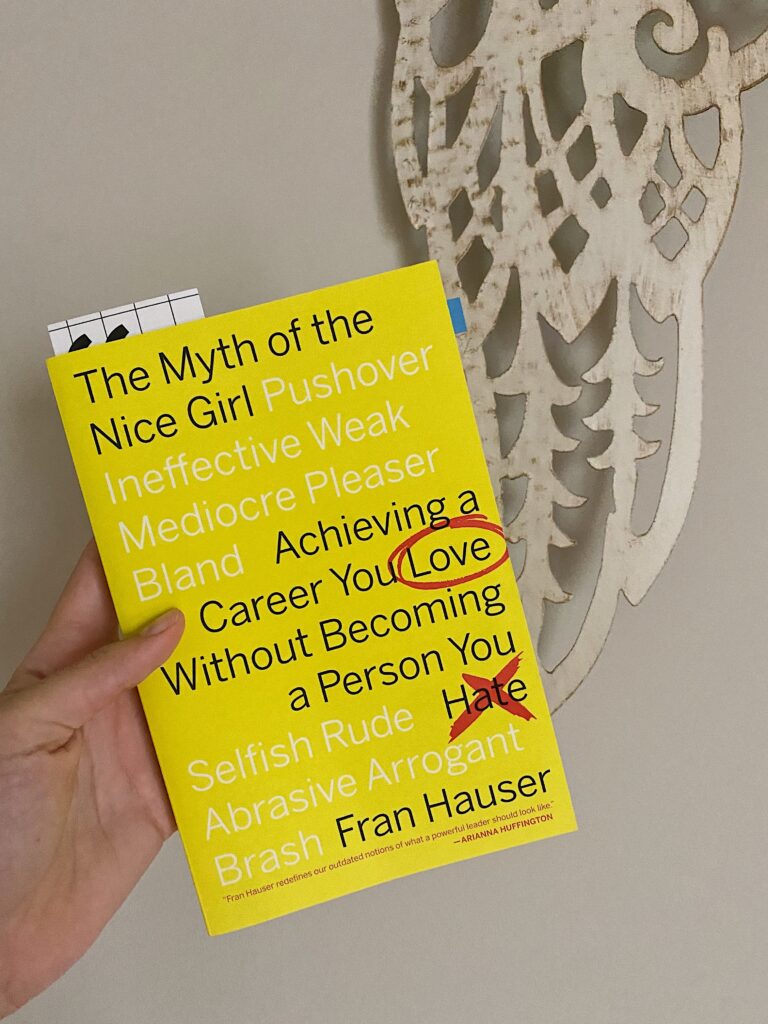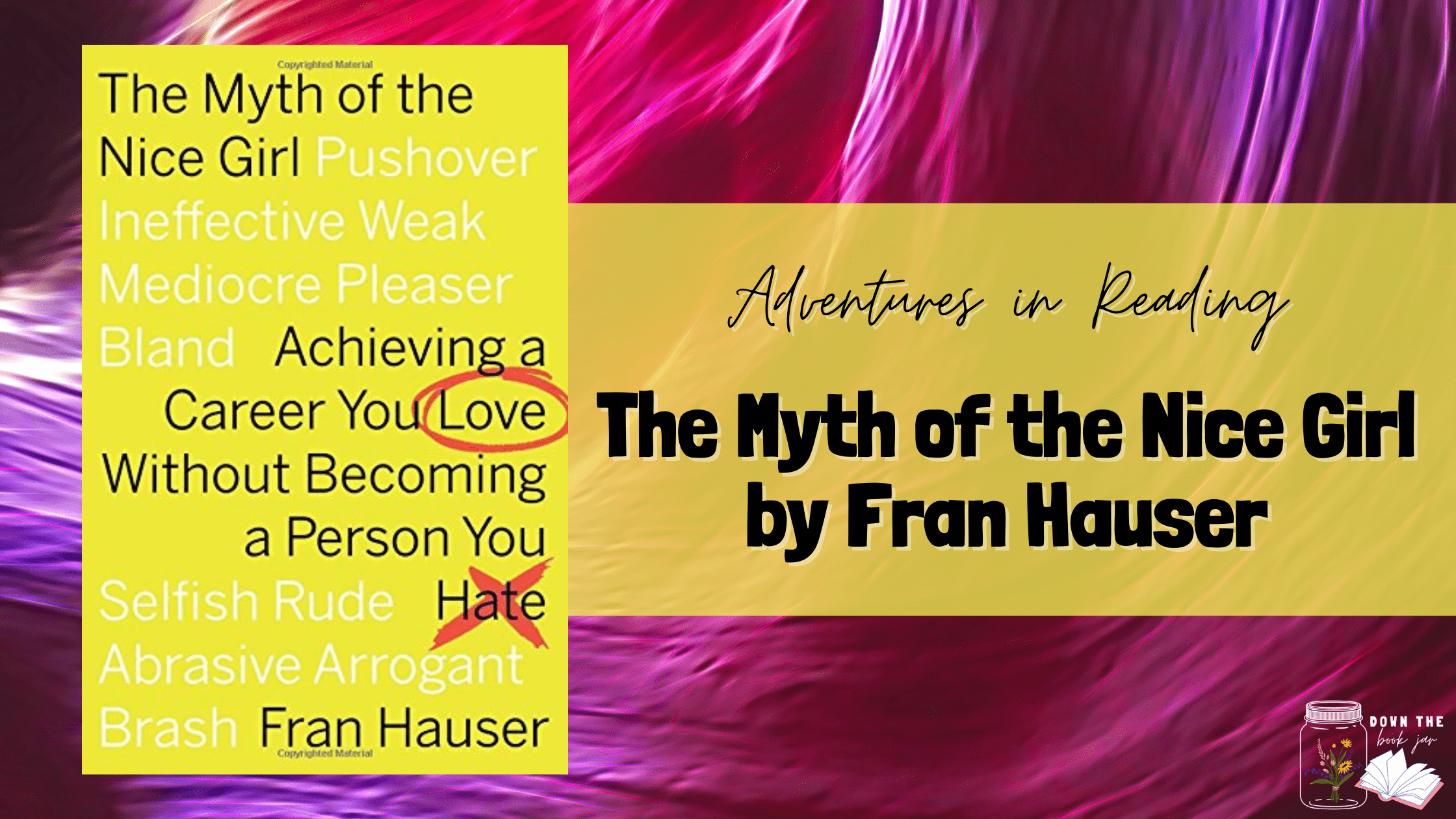The Myth of the Nice Girl by Fran Hauser
A couple of years ago, we hosted a women’s event as part of a conference at work. I wanted to give a gift to all of the women who attended, and one of my coworkers mentioned The Myth of the Nice Girl. There was a copy left over, so I brought it home. It has been sitting on my shelf since 2019, and I decided to finally get around to reading it.

The Book
A candid guide for ambitious women who want to succeed without losing themselves in the process
In The Myth of The Nice Girl, Fran Hauser deconstructs the negative perception of “niceness” that many women struggle with in the business world. If women are nice, they are seen as weak and ineffective, but if they are tough, they are labeled a bitch.
Hauser proves that women don’t have to sacrifice their values or hide their authentic personalities to be successful. Sharing a wealth of personal anecdotes and time-tested strategies, she shows women how to reclaim “nice” and sidestep regressive stereotypes about what a strong leader looks like. Her accessible advice and hard-won wisdom detail how to balance being empathetic with being decisive, how to rise above the double standards that can box you in, how to cultivate authentic confidence that projects throughout a room, and much more.
The Myth of the Nice Girl is a refreshing dose of forward-looking feminism that will resonate with smart, professional women who know what they want and are looking for real advice to take their career to the next level without losing themselves in the process.
My Thoughts
I needed this book. I certainly can be seen as all of the negative words on this book’s cover, and need to overcome it. I tend to bounce back and forth between the pushover side of things (if I struggle with someone) or a bitch. The Myth of the Nice Girl taught be how to find a bit of a middle ground.
In Chapter 2, Fran Hauser talks about being both ambitious and likeable. She shares what she believes ambitious people do:
When I think about someone who is ambitious, I think about someone who does three things. They take credit for their own work and ideas; they step up when opportunities arise; and they proactively create opportunities for themselves.
You can easily see how a woman might be perceived as rude or a bitch if they do any of these things, let alone all of these things. Fran goes on to share tactics and strategies for how to do all of these while maintaining your niceness.
I also appreciated the scientific research she presented on why women (as young girls) are more likely to to be meek and afraid to step up:
So why do so many women still subconsciously sabotage their own success by not speaking up? For one thing, women who do speak assertively are often perceived as being overly aggressive or pushy — a double standard that makes it difficult for women to know how to voice their opinions without seeming opinionated in a negative way to their peers. This goes back to a tendency to want to please others. Taking a stand will inevitably alienate someone — or so we assume — so instead we play it safe, act as people pleasers, and keep quiet.
This people-pleasing habit often begins in childhood. According to research by JoAnn Deak, Ph.D., when girls are between the ages of eight and twelve, they first become aware of how others perceive them and start “camouflaging” what they really think and feel in order to blend in better with their peers. These girls don’t want to stand our, so they stop speaking up and voicing their opinions and start acting like everyone else in order to please others and fit in.
This section made me think of the part in Dare to Lead where Brené Brown is talking about the girls who look at each other when asked if they’re hungry instead of voicing their own opinion. Women don’t even speak up to voice their hunger.
I have passages flagged in every chapter of this book. Different ways to handle conflict or step up for myself or even to help me find what it is I’m looking for. If you are a young professional woman, I cannot recommend The Myth of the Nice Girl enough.
Additional Resources
I posted to my Instagram stories after I finished The Myth of the Nice Girl that I wanted to find some more books similar to this one. I asked for recommendations, and Ms. Hauser herself gave me a ton! I haven’t ordered them yet, but they’re on my list!

- Drop the Ball by Tiffany Dufu
- Fearless by Rebecca Minkoff
- Detox Your Thoughts by Dr. Andrea Bonior
- We’re Speaking by Hitha Palepu
- Pick Three by Randi Zuckerberg
- Brag Better by Meredith Fineman
- Your Turn by Julie Lythcott-Haims
- The Lost Art of Connecting by Susan McPherson
- Bring Your Human to Work by Erica Keswin
- Undaunted by Kara Goldin
Note: This post contains affiliate links, so I may receive a commission from sales generated.

